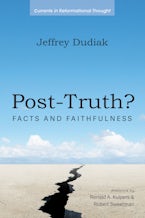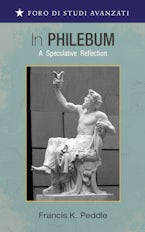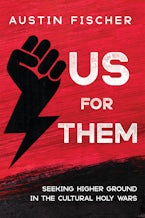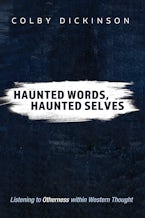Post-Truth?
Facts and Faithfulness
Foreword by Ronald A. Kuipers and Robert Sweetman
Series: Currents in Reformational Thought
Imprint: Wipf and Stock
In Post-Truth? Facts and Faithfulness, Jeffrey Dudiak explores the fissures and fractures that vex our so-called "post-truth" era, searching for a deeper, dare we say truer, understanding of the cultural forces that have led North American society to become so polarized. Eschewing the kind of easy responses that trade pluralistic solidarity for tribalistic certainty, Dudiak diagnoses a deeper breakdown in social trust as the underlying issue that has everyone today scurrying for comforting, ideological cover. In this context, Dudiak reminds the reader that truth is more, and runs deeper, than simple correspondence to the facts.
Jeffrey Dudiak is Professor of Philosophy at The King’s University in Edmonton, Alberta. He is the author of The Intrigue of Ethics: A Reading of the Idea of Discourse in the Thought of Emmanuel Levinas (2001).
“Jeffrey Dudiak has written a potent book that is a timely invitation to reconsider truth. He does so with eyes wide open to contemporary challenges. . . . Dudiak is pointing a way forward, not pining for a past. Our post-truth malaise is the outcome of diminished understanding of truth that settled for facts. He points to a richer and more radical understanding of truth as faithfulness. The result is a manifesto for the renewal of the university.”
—James K. A. Smith, author of You Are What You Love
“Dudiak delivers wisdom that startlingly overtakes us . . . and kindness, the depth of which in many respects is the very vehicle that carries it so compellingly. . . . Our author has tossed our world, drowning as we are in the deep end of the pool of late and postmodernity, a life vest that, should we dare to put it on, will not simply keep us from dying. It will teach us to live.”
—Curt Thompson, author of Anatomy of the Soul
“Jeffrey Dudiak has written a wonderful, concise treatise on how to approach truth in a post-truth age. . . . Writing with the depth of Dallas Willard and the clarity of C. S. Lewis, Dudiak offers both an analysis and a remedy that is sufficient in its overview and compelling in its response. I am delighted by the clarity and guidance it provides.”
—Gayle D. Beebe, President, Westmont College











